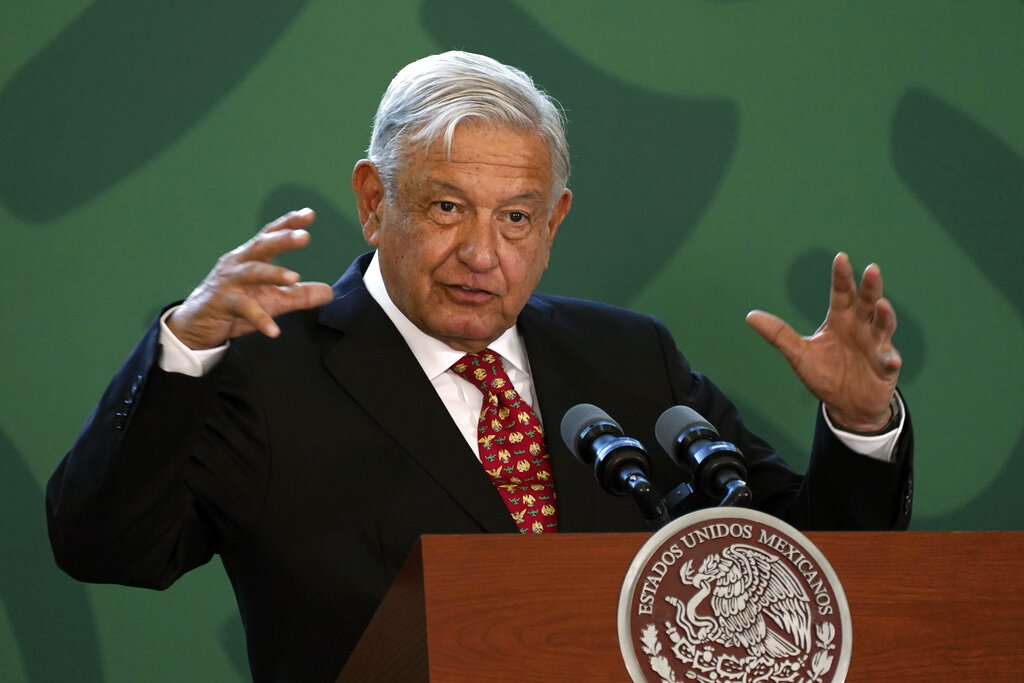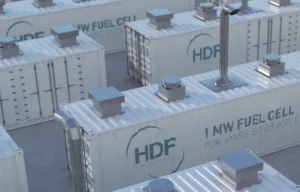
(Houston Public Media, 12.Apr.2022) — President Andrés Manuel López Obrador is using administrative measures to undermine the free-market reforms enacted in 2013. As a result, Mexican oil production is now more than 1 million barrels short of where the U.S. Energy Information Administration projected it would be if the reforms were fully implemented.
Mexico’s president survived a recall election on Sunday, meaning López Obrador will get another two-and-a-half years to continue reversing reforms that opened up the country’s oil and gas sector to foreign investment.
By renationalizing the oil industry, he’s also hampered U.S. efforts to compensate for the effects of Russia’s war in Ukraine on world oil markets.
Right now, Mexico produces up to 1.7 million barrels of oil a day. But according to the U.S. Energy Information Administration, the country could have produced as much as 2.9 million barrels a day if its energy reforms had been fully implemented.
“I think that amount, when we take into consideration what the world is going through right now with the war of Russia and Ukraine, I think that that oil could have come in very handy,” said Mariana Campero, former CEO of the Mexican Council on Foreign Relations and the host of the Center for Strategic and International Studies’ Mexican Matters podcast.
For the better part of eight decades, state control of oil and natural gas was considered the untouchable third rail of Mexican politics. That began to change with the presidency of López Obrador’s predecessor, Enrique Peña Nieto, who oversaw market reforms that allowed foreign direct investment in Mexico’s energy sector. In return for allowing such investment, Mexico got the capital and technological know-how it needed to modernize the sector and increase oil and gas production.
Fast forward to today, and López Obrador is undermining that reform by returning control of the oil and gas sector to Mexican state oil company Pemex, Campero said.
“He actually wants to roll back the reforms and go to an era in which the state controlled the whole sector, basically two monopolies,” Campero said. “There was one monopoly for oil and gas, which was Pemex, and there was another, the national utility company, called CFE. And right now, he’s pushing very hard to translate his vision into law.”
Pemex is no stranger to Houston — the company co-owned a refinery in Deer Park with Shell starting in 1993. But last year, Pemex made a deal to buy out Shell and take full control with the approval of the Committee on Foreign Investment in the United States, under the U.S. Treasury Department.
López Obrador celebrated the sale’s completion in January, praising the purchase as a victory for the people of Mexico.
“Yesterday, the deal was closed so that Mexico, the people of Mexico, could become the owner of the Deer Park refinery,” he said at the time. “As of yesterday, that refinery belongs to the Mexican nation.”
The phrasing speaks to López Obrador’s populist and nationalistic view of the Mexican energy sector. His political party, Morena, is in the minority in both chambers of the Mexican Congress, which limits his ability to change the law.
But, as Campero put it, “through administrative fiat or changing policy direction, (López Obrador) actually has been able to create enormous obstacles to competition, and there have been sharp declines in oil and gas production.”
A big part of the decline in Mexican production is because all of the country’s easy-to-reach crude oil is tapped out. Pemex and the Mexican government behind it lack the capital to fund exploration and production from onshore shale plays or the deep waters of the Gulf of Mexico.
The country’s 2013 reform would have made that possible by drawing in foreign investment, giving private companies a stake in the future of the country’s energy sector. Now, all that is up in the air.
“It’s really making all of the companies that had planned to make investments in Mexico’s energy industry second guess things,” said Fernando Zavala, vice president for upstream at financial services firm Pickering Energy Partners.
In 2017, Houston-based Talos Energy discovered the billion-barrel Zama oil field in the Sureste Basin off the coast of the Mexican state of Tabasco, López Obrador’s home state. In July of last year, the Mexican Energy Secretariat appointed Pemex as the field’s operator.
Talos tried negotiating to maintain control of the field at least long enough to get it up to peak production before handing it over to Pemex — to no avail.
“Talos is a proven, safe, and reliable operator. Pemex is not,” Zavala said. “The day that they announced that Pemex was going to be operator, one of the platforms caught on fire offshore.”
Tony Payan, who heads the Center for United States and Mexico Studies at Rice University‘s Baker Institute, said companies that invested in Mexico over the past decade are suffering.
“When I spoke to an official in Mexico and I asked that official, ‘hey, what about the business environment, the ability to instill confidence in oil companies, in gas companies, and others to invest in Mexico given Mr. López Obrador’s ideological position?'” Payan recalled. “And he said, ‘Well, you know, they can always sue us.’”
All of this means Mexico can’t drill for all the oil it wants to.
“Mexico is certainly not going to have the capital, and it’s not going to attract the capital to increase the production in oil,” Payan said. “So they’re stuck. They’re essentially stuck in time.”
Experts say if López Obrador had his way Mexico’s six refineries would process all of its crude oil. In other words, he would cut off all crude oil exports to the United States.
With that in mind, Pemex is now building a seventh domestic refinery in the state of Tabasco. That will bring López Obrador’s vision that much closer to reality when his term ends in 2024.
But it’s far from clear López Obrador’s successor will seek to carry on his policies. And in the meantime, it’s unlikely he’ll be able to make good on his threat to cut off crude oil exports to the U.S.
“Mexico produces a very heavy crude, and Mexico does not have the capacity to refine that,” Payan said. “Only Texas has that capacity for the short and mid-term to help Mexico refine that that crude.”
____________________

